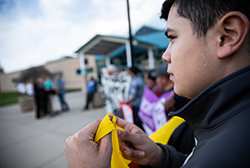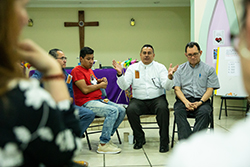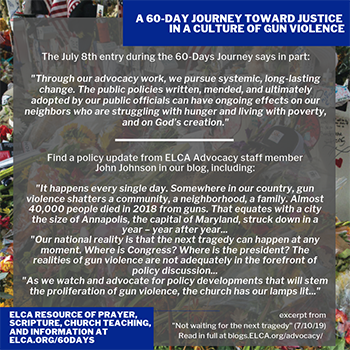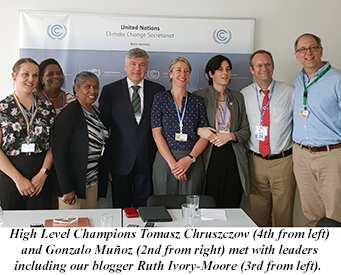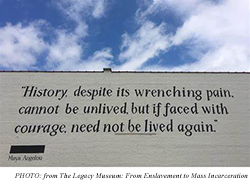Most years, Congress recesses for the month of August. Legislators return to their home states and congressional districts and connect with constituents.
This is a great opportunity for local advocates to engage with elected officials, ask questions and share concerns. Our August Recess Guide contains tips for communicating with your elected officials and candidates this month.
Here are some timely questions and talking points based upon ELCA Advocacy priorities.
ADDITION 8/8/2019 –
 The ELCA is saddened by the all-too-frequent occurrences of gun violence in the U.S. In 1994, the ELCA adopted the social message Community Violence, calling for advocacy to end the cycle of violence in the U.S. Twenty-five years later, this message is still relevant. Our baptismal covenant calls us to strive for justice and peace in all the world.
The ELCA is saddened by the all-too-frequent occurrences of gun violence in the U.S. In 1994, the ELCA adopted the social message Community Violence, calling for advocacy to end the cycle of violence in the U.S. Twenty-five years later, this message is still relevant. Our baptismal covenant calls us to strive for justice and peace in all the world.
THIS MOMENT IN TIME: Gun violence
Some 40,000 people died in 2018 from gun violence in the U.S. Somewhere in our country, gun violence daily shatters a community, a neighborhood, a family. Whereas advocacy and the application of ELCA gun-violence positions in the public square are most visible when prompted by mass shootings, such incidents generally reveal the need for sustained spiritual and political response.
Only a small start has been seen in the 116th Congress of legislative response to this need. The House passed the bi-partisan Background Check Act of 2019 (H.R. 8) in February which would close loopholes for certain kinds of guns sales, such as those at gun shows and over the internet, by only allowing person-to-person gun sales if background checks could be conducted. Senate leadership has blocked consideration of this important legislation in that body [update 8/9/2019 – There has been movement on this issue]. Legislation such as the 1994 Assault Weapons Ban that would ban military assault weapons and Ethan’s Law that would require safe storage of firearms should be debated and passed. Policy consideration of high capacity magazine access and gun lock policies is needed as well as investment in domestic violence prevention.
QUESTION:
- As a member of Congress, what are you doing to address the proliferation of guns in our society, the use of military grade weapons in mass shootings, and protection of our children in schools?
ORIGINAL POST 7/25/2019 –
 God richly provides for our daily bread — the earth can produce enough food for everyone. Yet, many of our sisters and brothers still go hungry.
God richly provides for our daily bread — the earth can produce enough food for everyone. Yet, many of our sisters and brothers still go hungry.
THIS MOMENT IN TIME: Child nutrition programs
Child nutrition reauthorization is in discussion in the 116th Congress. Right now, the Senate Agriculture Committee is working to write bipartisan child nutrition legislation that would continue the advances made in recent years in child nutrition, add flexibility to the programs, ensure community eligibility for high-poverty school districts and protect progress toward making these meals healthier. The Senate bill could be introduced as soon as Labor Day. The House is behind but could take up a Senate bill quickly.
Child nutrition programs expired in 2015 and must be renewed through congressional action called reauthorization. These programs — school lunches, breakfasts, after-school snacks and summer meals, as well as the Women, Infants, and Children (WIC) program — prevent hunger and a host of educational and health-related deficiencies for children in nearly every community throughout the country. On an average day during the 2017-’18 school year, 12.5 million low-income children received free or reduced-price breakfasts and 21.9 million received free or reduced-price lunches According to the latest U.S. Department of Agriculture data in 2017, 12.5 million (17%) children lived in households facing a constant struggle against hunger.
QUESTION:
- Renewing strong child-nutrition program reauthorization before the end of this year is crucial, but time is short. What are you doing to bring bipartisan legislation to a vote?
 Secure shelter is a critical component of the foundation of the human person, the absence of which can contribute to hunger and challenges in health care, education, job prospects and more.
Secure shelter is a critical component of the foundation of the human person, the absence of which can contribute to hunger and challenges in health care, education, job prospects and more.
THIS MOMENT IN TIME: Affordable housing and homelessness
In the 2019 congressional spending deal, housing programs saw some of the smallest increases compared to other federal programs, and many state budgets face similar circumstances. Because many Lutherans are involved in sheltering and lifting up people who struggle with poverty, many of us would like to see greater investment in and focus on affordable housing.
Lack of affordable housing and rising costs are gaining more attention within local communities. Only an estimated one-third of citizens eligible for affordable housing actually receive assistance, and nearly 11 million families spend over half their income on rent. Skyrocketing housing costs force many to decide between paying for food or settling their other bills, leaving many with the constant threat of eviction and losing their home.
QUESTION:
- Support for housing programs and funding for people facing homelessness are too often a low priority for elected officials. As a national leader, will you work to make access to housing programs a top priority in Congress?
 As stewards of this world, we are called to care for the earth and examine our behavior toward creation. While we need to take from the land for food and sustainability, we also need to be careful that we maintain good stewardship and do not exploit the wonderful things the earth provides.
As stewards of this world, we are called to care for the earth and examine our behavior toward creation. While we need to take from the land for food and sustainability, we also need to be careful that we maintain good stewardship and do not exploit the wonderful things the earth provides.
THIS MOMENT IN TIME: Renewable-energy tax credit
The current renewable-energy tax credit bill does not prevent the phaseout of a number of crucial renewable-energy tax credits, which have helped to catalyze significant investment in renewable energy development and are beneficial to the environment in lowering emissions and thereby providing for cleaner air. There is discussion around a comprehensive green energy package. Efforts to salvage the tax extensions on wind and solar are critical, so that the progress made thus far is not eroded.
QUESTION:
- How does Congress start to address the tax credits and a green energy package in bipartisan manner?
THIS MOMENT IN TIME: Environmental ills
The 2018 Intergovernmental Panel on Climate Change (IPCC) report and the United States’ own National Climate Assessment report clearly show the state of environment degradation and the harm being caused by emission of greenhouse gases. Additionally, we continue to see a growing number of severe weather events related to the earth’s warming that are causing unprecedented damage and affecting everyone. Congress must begin to address these environmental ills in a bipartisan manner, ensuring that the poor, the elderly — the most vulnerable — are not harmed and do not shoulder the costs of reaching a carbon-neutral society.
QUESTION:
- Where does the Congress stand on developing legislation to mitigate and adapt to the effects of climate change and to produce resilient communities here in the United States, such as: building resiliency against disasters; leveraging funding for community investments; upgrading and repairing infrastructure; and reaching net-zero greenhouse gas emissions?
 Concern for the well-being of others lies at the very heart of Christian faith. Christians have a variety of social identifications through their nation of origin, race, ethnicity or political affiliation, but all Christians have a common identity as children of a loving creator.
Concern for the well-being of others lies at the very heart of Christian faith. Christians have a variety of social identifications through their nation of origin, race, ethnicity or political affiliation, but all Christians have a common identity as children of a loving creator.
THIS MOMENT IN TIME: Foreign assistance
The international affairs budget constitutes just 1% of the federal budget. The U.S. has a rich history of providing humanitarian and development assistance to countries experiencing humanitarian emergencies and extreme poverty. We must protect and sustain our development and humanitarian programs to avoid more costly interventions in the future.
With so many complex challenges in our world, through these programs the U.S. government is able to provide treatment for HIV/AIDS, tuberculosis and malaria; address food insecurity and malnutrition; and provide care for mothers and children. We know, for example, that even short bouts of hunger and malnutrition in the critical 1,000 days between a woman’s pregnancy and her child’s second birthday can lead to needless death and have devastating lifelong consequences for children who survive — reducing their overall health, learning ability and earning potential. Millions of lives have been saved over the years because of U.S. support. But we cannot stop now. This work must continue, especially because more people need assistance due to global instability and ever-increasing humanitarian crises.
QUESTIONS:
- How important do you think it is to provide foreign assistance to low-income countries?
- What would you do to address global health challenges such as Ebola, TB, HIV/AIDS and malaria?
- The needs of women and children are often relegated to the margins when it comes to economic and social advancement programs. What kind of policies and accountability measures can you suggest to address this inequality? Will you commit to working on this issue?
 Our Lutheran faith calls us to see our neighbors as ourselves. As people flee their communities, the ELCA will continue to stand alongside its immigrant neighbors.
Our Lutheran faith calls us to see our neighbors as ourselves. As people flee their communities, the ELCA will continue to stand alongside its immigrant neighbors.
THIS MOMENT IN TIME: Migration
Lutherans have a deep-rooted history in refugee and immigrant issues. The God-given dignity of all people and the value of family unity have been cornerstones of ELCA faith-based advocacy, and we understand that many immigrants, as well as their families, are both frightened and confused by recent developments. We are mindful of those on the forefront, including ELCA congregations in U.S. border communities who are providing spiritual and physical sustenance, as well as border patrol officers, resettlement staff and many others charged with implementing our nation’s policies compassionately. The daily experience of ministries, Lutheran organizations and members “keep before us — so that we do not forget — the grim realities many immigrants face and the strength of character and resourcefulness newcomers demonstrate,” notes the ELCA social message “Immigration.”
Recent policies and practices, including restriction of asylum access, expanding expedited deportations, and conditions in detention centers could prevent many of the most vulnerable asylum seekers from entering the U.S. at ports of entry or going through due process in a U.S. court based upon their legal rights.
QUESTIONS:
- What are you doing to make our broken immigration infrastructure more humane and just?
- What are your views on recent unilateral actions to sequester asylum seekers? What is your plan to address heightened tensions on our southern border?
Reach out to your ELCA state public policy offices in more than 16 states or to the ELCA Advocacy national office at washingtonoffice@elca.org. We are available to answer your questions and aid you in the process.
Your question can spark an important conversation and provides an opportunity to hold your elected official publicly accountable. Thank you!
 This policy will cause a cascade of negative impacts, including increasing hunger, blocking family unification and severely restricting immigration of people who want to come and contribute to our nation.
This policy will cause a cascade of negative impacts, including increasing hunger, blocking family unification and severely restricting immigration of people who want to come and contribute to our nation.









